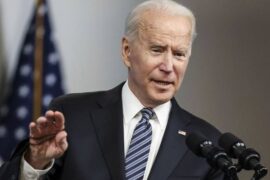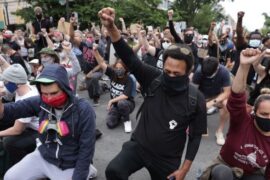Andrés Manuel López Obrador, leader of the Movement for National Reconstruction (Morena), was elected president of Mexico on Sunday by a massive margin amid high voter turnout.
His two main opponents, José Antonio Meade (Institutional Revolutionary Party, PRI) and Ricardo Anaya (Together for México coalition, which includes the National Action Party, PAN, and the Party of the Democratic Revolution, PRD) conceded early yesterday evening.
A record number of voters cast their ballots. Voters waited for hours at their polling stations and by noon over fifty percent of those eligible had already voted. By the end of the electoral process, seventy percent had voted, a historic turnout.
The results show a collapse in support for the main parties of the Mexican bourgeoisie in the face of widespread hostility to inequality, state-sanctioned violence, the militarization of society, and the right-wing policies of United States President Donald Trump. The PRI and PRD were devastated by the results.
All in all, more than 3,400 posts are being determined by the vote. In addition to electing a president, Mexican voters also voted to fill 500 seats in the lower house of congress, and 128 senatorial seats.
The massive turnout reflects the anger and frustration of the Mexican working class. In addition to outrage over two hundred thousand killings and tens of thousands of disappearances over the last twelve years, there is mass anger over the interrelated issues of increasing poverty, inequality, and widespread government corruption and impunity for criminal acts.
A business elite, allied with the ruling PRI, in league with the PAN and PRD, is widely despised. The collapse of the PRI is particularly significant, as the party has exercised its domination over the country’s political system for nearly a century, with the exception of two PAN presidencies from 2000-2012.
Popular anger has fed support for López Obrador, particularly among young voters, who have repeatedly shown that they have no confidence in the traditional parties. An estimate based on social media gives López Obrador 51 percent of the youth vote, followed by 24 percent for the PRI’s Meade and 14 percent for Anaya of the PAN coalition.
Protest rallies took place at special voting stations, set up for those voters that could not get to their assigned locations. Many of them ran out of ballots, as voters demanded their democratic right to vote.
López Obrador, long depicted as a “leftist” who fell short of winning the presidency in his 2006 and 2012 elections, ran a pro-corporate campaign. Its main purpose was to convince the Mexican and American ruling classes that his election would not impinge upon private profit or capitalist property relations.
Though full results will not be known until later on Monday, exit polls give López Obrador between 43 and 49 percent of the vote, ahead of Meade, who obtained between 22 and 26 percent of the vote, and Anaya with 23 to 27 percent of the vote. Other exit polls have López Obrador winning over 50 percent.
Other Morena candidates also appear likely to win, including Claudia Sheinbaum, Morena’s Jewish candidate for mayor of Mexico City, ending 21 years of PRD control. Morena is also expected to win the governorships of the states of Morelia, Tabasco and Chiapas.
Exit polls from the legislative elections show the Morena-led alliance, which also includes the Workers Party (PT), with above 50 percent of federal deputies. According to unofficial exit poll results, the PT won between 64 and 75 seats—nearly double the PRI’s expected total (between 37 and 47 seats). The PAN won between 63 and 76 seats, and the PRD between 33 and 43 seats. Morena is expected to win between 127 and 142 seats. If these results hold, the PRI will have lost three-quarters of its current seats in the chamber of deputies.
The projected results of the PT — a party with Maoist origins —would be particularly notable if they hold. The PT currently has zero seats in the chamber of deputies (it has 19 of 128 seats in the senate). In a statement yesterday, López Obrador said he cast his presidential vote symbolically for Rosario Ibarra de Piedra, former candidate for the Pabloite Workers Revolutionary Party (PRT) and a current PT member.
The candidates of the parties opposing Morena and López Obrador were conciliatory in their concession speeches, indicating an intention on the part of the ruling class to accept López Obrador’s election. The bourgeois press has lauded the election as “a victory for democracy.”
Nevertheless, the vote was marred with several hundred incidents of violence and disappearances.
As the polls were about to open, Flora Reséndiz González, 49, an activist of the PT, was assassinated at her home in Contepec, Michoacán. Reséndiz died in the hospital at 6:30 a.m. Her death added to the 138 candidates killed during the election campaign in Mexico. PT leader Alberto Anaya Gutiérrez condemned the killing and called for an investigation: “We are profoundly saddened by the death of our beloved comrade,” declared Anaya, adding that this and other killings are symptoms of “social decomposition.”
The killing of candidates has been a feature of this campaign. It is blamed on local drug gangs that get to decide with impunity which candidate is not acceptable to them. On the day of the election there were also reports from the states of Chiapas, Veracruz and Mexico of the destruction of polling stations, armed gunmen in the open forcing voters to vote and instructing them on how to vote. In Veracruz, in an incident seemingly unrelated to the voting, two men waiting in line were kidnapped and whisked away.
Polls opened at 7:00 a.m. National Election Electoral Institute head Lorenzo Córdova indicated that there were 156,807 polling stations around the country and that only 4 would not open. Some 89 million voters were eligible to vote, half of which are under forty years old. Thirteen million are first-time voters.





